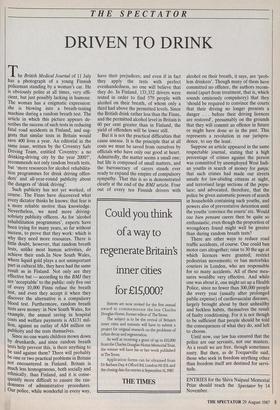THE SPECTATOR
DRIVEN TO DRINK
The British Medical Journal of 11 July has a photograph of a young Finnish policeman standing by a woman's car. He is obviously polite at all times, very effi- cient, but just possibly lacking in humour. The woman has a enigmatic expression: she is blowing into a breath-testing machine during a random breath test. The article in which this picture appears de- scribes the success of such tests in reducing fatal road accidents in Finland, and sug- gests that similar tests in Britain would save 400 lives a year. An editorial in the same issue, written by the Coventry Safe Driving Team, entitled 'Coventry: a no drinking-driving city by the year 2000?', recommends not only random breath tests, but 'more resources for alcohol rehabilita- tion programmes for drink driving offen- ders' and all-year-round publicity about the dangers of 'drink driving'.
Such publicity has not yet worked, of course. The Finns have discovered what every dictator thinks he knows: that fear is a more reliable motive than knowledge. Nevertheless, we need more driving- sobriety publicity officers. As for 'alcohol rehabilitation programmes', experts have been trying for many years, so far without success, to prove that they work: which is why they need more resources. There is little doubt, however, that random breath tests, unlike most human activities, do achieve their ends.In New South Wales, where liquid gold plays a not unimportant part in cultural life, they have had the same result as in Finland. Not only are they effective but — according to the BMJ they are 'acceptable' to the public: only five out of every 10,000 Finns refuse the breath test, and even they accept it when they discover the alternative is a compulsory blood test. Furthermore, random breath tests save money: in New South Wales, for example, the annual saving in hospital costs and welfare payments is A$131 mil- lion, against an outlay of A$4 million on publicity and the tests themselves.
Since no one wants children mown down by drunkards, and since random breath tests help prevent this, is there anything to be said against them? There will probably be one or two practical problems in Britain not encountered in Finland. Britain is much less homogeneous, both socially and ethnically, than Finland, and it is conse- quently more difficult to ensure the ran- domness of administrative procedures. Our police, while wonderful in every way, have their prejudices; and even if in fact they apply the tests with perfect evenhandedness, no one will believe that they do. In Finland, 133,332 drivers were tested in order to find 579 people with alcohol on their breath, of whom only a third had above the permitted levels. Since the British drink rather less than the Finns, and the permitted alcohol level in Britain is 60 per cent greater, than in Finland, the yield of offenders will be lower still.
But it is not the practical difficulties that cause unease. It is the principle that at all costs we must be saved from ourselves by officials who have only our good at heart. Admittedly, the matter seems a small one; but life is composed of small matters, and the bureaucracy of carers stands ever ready to expand the empire of compulsory sympathy. That this is so is demonstrated clearly at the end of the BMJ article. Four out of every ten Finnish drivers with alcohol on their breath, it says, are 'prob- lem drinkers'. Though many of them have committed no offence, the authors recom- mend (apart from treatment, that is, which sounds ominously compulsory) that they `should be required to convince the courts that their driving no longer presents a danger . . . before their driving licences are restored', presumably on the grounds that they will commit an offence in future or might have done so in the past. This represents a revolution in our jurispru- dence, to say the least.
Suppose an article appeared in the same respectable journal, stating that a high percentage of crimes against the person was committed by unemployed West Indi- an youths in search of money for ganja; that such crimes had made our streets unsafe for law-abiding citizens at night, and terrorised large sections of the popu- lace; and advocated, therefore, that the police be given automatic powers of search in households containing such youths, and powers also of preventative detention until the youths 'convince the courts' etc. Would our bien pensant carers then be quite so enthusiastic, even though the proportion of wrongdoers found might well be greater than during random breath tests? There are other ways to reduce road traffic accidents, of course. One could ban motor cars altogether; raise to 30 the age at which licences were granted; restrict pedestrian movements; or ban motorbike couriers in London, who are responsible for so many accidents. All of these mea- sures wouldbe very effective. And while one was about it, one might set up a Health Police, since no fewer than 300,000 people die every year (usually after prolonged public expense) of cardiovascular diseases, largely brought about by their unhealthy and feckless habits, themselves the result of faulty conditioning. For it is not though to be sufficient that people should be told the consequences of what they do, and left to choose.
Until now, our law has ensured that the police are our servants, not our masters. As a result we are free, though sometimes nasty. But then, as de Tocqueville said, those who seek in freedom anything other than freedom itself are destined for servi- tude.










































 Previous page
Previous page